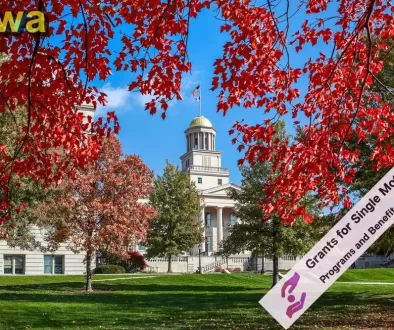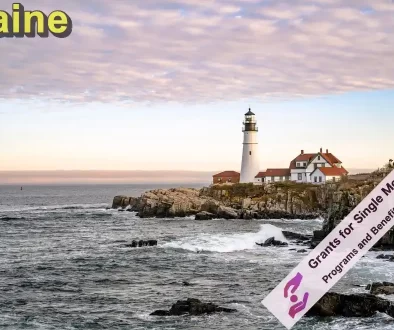Grants for Single Mothers in Hawaii
In Hawaii, one out of every 9.7 residents of lives in poverty. 143,148 of 1,383,246 residents reported income levels below the poverty line in the last year. The state of Hawaii has a poverty rate of 10.3%, ranking the state 5th in Poverty Rate at 10.3%. This might not so sound good at first, but Hawaii’s poverty index is much lower than the national average of 14.6%. Female residents of Hawaii are moderately (17%) more likely to live in poverty than males.
Even though Hawaii, generally speaking, has a better income rate than some other states, their local government has created several programs to help its population in need, and among them we would like to mention:
Medicaid Free-for Service Program
The Medicaid FFS Program is the traditional Medicaid Program that has provided medical coverage to low-income Hawaii residents since January 1966. The program provides coverage for individuals who are age 65 and over, or under age 65 who are blind or disabled. Medicaid FFS Program recipients must meet the following requirements:
- Be a Hawaii resident
- Be a U.S. citizen or legal immigrant and be able to provide proof of their citizenship
- Provide proof of their identity
- Provide a Social Security Number
- Not reside in a public institution
- Be age 65 and older
- If under the age of 65, must be certified to be blind or disabled by the State or the Social Security Administration
- Meet an asset test
- Meet an income test
Healthcare and Medical Assistance
Medical assistance is medical coverage provided for eligible low-income Hawaii residents. This medical assistance is called Hawaii QUEST, commonly known as QUEST, is a program that provides health coverage through health plans for eligible Hawaii residents. It provides medical and mental health services. Dental services are provided under the Medicaid Fee-For-Service Program. QUEST is administered by the Department of Human Services, Med-QUEST Division and is financed through the State of Hawaii and the Federal Centers for Medicare and Medicaid Services.
If you are pregnant and need medical coverage, you may apply for medical assistance at any time. Even if you applied before and were not eligible, you may be eligible now. To receive special processing, be sure your application says that you are pregnant. For eligibility purposes, either a home pregnancy test or a health care provider, who could be a physician, a nurse midwife, a pediatric nurse practitioner, or a family nurse practitioner must medically verify your pregnancy. A pregnant woman, however, shall not be required to provide documentation that her pregnancy has been medically verified.
In order to qualify for this benefit program, you must be a resident of the state of Hawaii, a U.S. national, citizen, or qualified alien in need of health care/insurance assistance, whose financial situation would be characterized as low income. You must not be age 65 or older, blind, or disabled.
Rental Assistance for Single Mothers in Honolulu
Hawaii provides services for single mothers under the federal Tenant-Based Rental Assistance Program. While there are several target areas of the program, perhaps the most important focus is on single mothers that need safe yet affordable housing for their young families.
One of the requirements for eligibility includes that the total household income cannot be greater than 80% of the area median income in order to qualify. Additionally, once someone does qualify, her actual benefit amount may be greater if she has a large family, since an apartment with multiple bedrooms would likely be a need.
If you are a single mom and would like to apply for various assistance programs, you may contact one of the following partners of the City and County of Honolulu:
- Catholic Charities, 808-521-4357
- Helping Hands Hawaii, http://www.loantorent.com/helping-hands-hawaiis-emergency-assistance-program-assists-with-rent-payments-in-the-face-of-hardship/ 808-536-7234
- The Institute for Human Services, 808-447-2863
- Kalihi-Palama Health Center, 808-791-4545
- Waianae Coast Comprehensive Health Center, 808-697-3300 Ext. 3594
Childcare Connection Hawaii Program
This program was created to help single mothers and low-income families. Childcare Connection Hawaii Program has 2 subsidy programs:
The Child Care Connection Hawaii (CCCH)
CCCH subsidy program helps low-income families to sustain their employment, educational efforts and job training by paying a subsidy for their children who are in the care of DHS-approved childcare providers. Unless childcare is required for protective purposes, families must meet income and activity requirements to qualify for this subsidy program.
The Preschool Open Doors (POD) Program
POD is a separate subsidy program with limited funds that provides services state-wide to families sending their children to a licensed preschool during the school year prior to kindergarten entry. The goal of POD is to promote school readiness for children, and the program focuses on meeting the needs of the child. Parents are not required to have an eligible activity, unlike the CCCH Subsidy program, but they must meet income and other eligibility requirements. For POD, there is a time-limited application period established and published each year.




